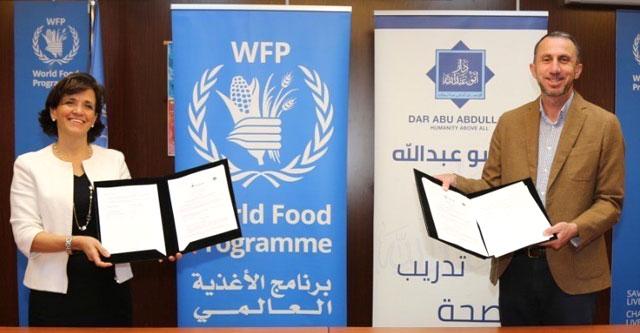- Local News
- Thu-2020-06-11 | 03:36 pm

The 15-month project will empower individuals through capacity building, job matching and micro and home-based businesses in three main sectors: Food production and agriculture, handicrafts and digital finance, according to a WFP statement shared with The Jordan Times on Tuesday.
The project targets 1,000 young people, both Jordanians and refugees — of which 50 per cent are women — from the most vulnerable families living in Amman, Madaba, Irbid, Mafraq, Jerash and Ajloun governorates. In addition, persons with disabilities will also participate in the project, the statement said.
In 2019, the WFP and DAA had implemented a similar one-year project focusing on capacity building and market linkages.
"We thank the WFP for its continued support to Dar Abu Abdullah’s mission and goals, and we are very happy to be renewing this strategic partnership agreement,” said DAA Director General Samer Balkar during a signing ceremony held recently at the WFP’s premises in Amman.
"Dar Abu Abdullah’s projects respond to the socio-economic effects of the COVID-19 pandemic. We are empowering young people, helping them to start home-based businesses and connecting them with available work opportunities in the agricultural and industrial sectors," he said in the statement.
"This is in line with the directions of His Majesty King Abdullah, who emphasised the need to utilise the agricultural stations across the Kingdom in order to support the local community through employment and training in modern agricultural methods, where these stations can be used as incubators for advanced agricultural projects,” he added.
WFP Country Director and Representative Sarah Gordon-Gibson said: "Through our joint activities, the WFP is committed to supporting the Government of Jordan’s efforts to adapt and respond to the current socio-economic challenges and ensure food security for vulnerable families. This project will provide young people with skills and a sustainable source of income through employment opportunities."
The activities will start in June, and DAA will take all the preventive and precautionary measures set out by the government in response to COVID-19.
The project aims to enhance the self-reliance of the most vulnerable populations in Jordan and contribute to the 2030 Sustainable Development Agenda, the statement said. DAA is a non-profit, non-governmental organisation with a mission to empower the most vulnerable individuals and sustain their livelihoods through projects that address the underlying causes of hunger and poverty across Jordan, according to the statement.
Named after His Majesty the late King Hussein Bin Talal and chaired by HRH Princess Haya Bint Al Hussein, DAA was established in an effort "to honour His Majesty's spirit and his belief that the individual represents a nation's greatest asset”.









